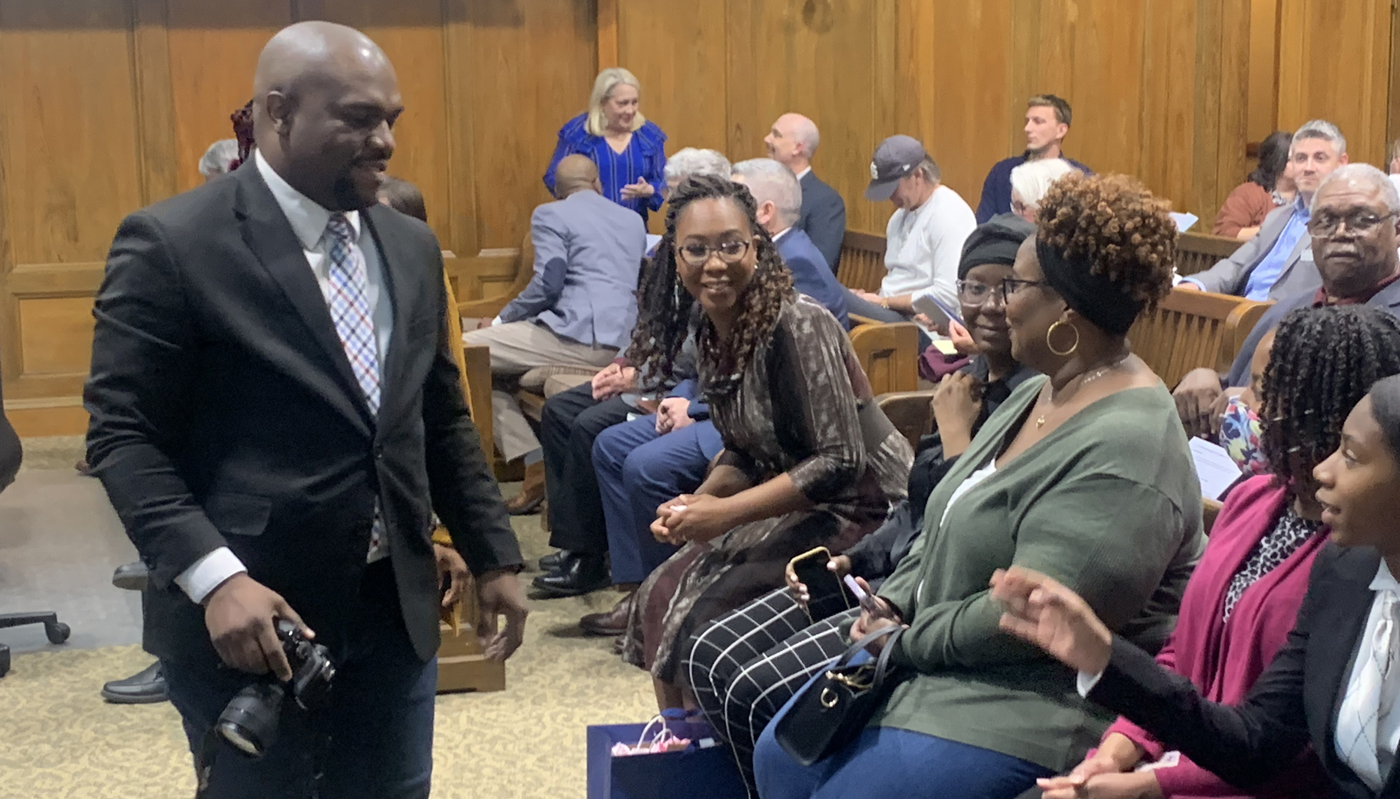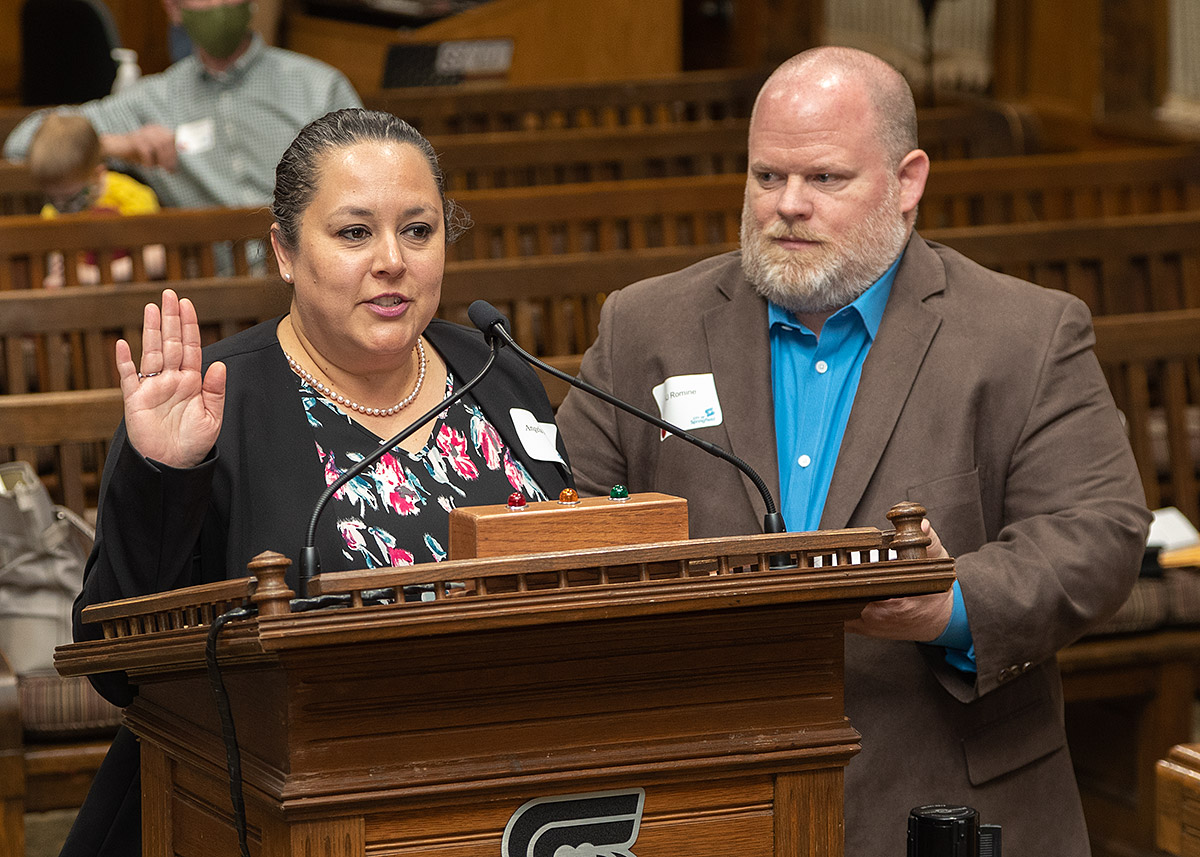Monica Horton officially joined the Springfield City Council Tuesday night and will represent northwest Springfield for at least the next year.
Horton took the oath April 18 to serve as the Council's Zone 1 representative. She will serve part of the unexpired term created earlier this year when Angela Romine stepped down to run for the Missouri Senate. Horton took her oath of appointment at the start of Monday night’s meeting at Historic City Hall and began serving immediately, even asking a question after a presentation on a resolution about diversity, equity and inclusion.
Horton’s term will expire in April 2023. In the April 2023 municipal election, she and any other candidates could run for the Zone 1 council seat, with a prorated term expiring in April 2025. City council members are typically elected to four-year terms.
Inward and outward goals
Horton has two goals on her mind. One is internal, and that’s to get to know more people in Zone 1, or northwest Springfield. The second goal is to be part of northwest Springfield’s revitalization in the months and years to come.
“I don't think a lot of people know me very well,” Horton said on April 12, as she went through an interview with seven Springfield City Council members and Mayor Ken McClure.
Shortly after the council interviewed Horton and three other applicants for a vacant spot representing Zone 1, it conferred in a short closed session. Moments after returning to open session, the Springfield City Council, by a 7-1 vote, decided on Horton as the best choice among four applicants.
In an effort to introduce herself to her soon-to-be fellow council members, Horton shared some of her thoughts on northwest Springfield, along with some personal information about her life.
“I have a deeply held belief that Zone 1 is the heart and soul of Springfield,” Horton said.
Long term, Horton wants northwest Springfield to transform into a place where people are willing to move into when they move to Springfield, rather than be a place people leave when they have the opportunity.
“I would like to see Zone 1 become an attractive place for growth and development, but not just because of how underdeveloped and blighted the land and the buildings are, or how high the poverty rate is or how high the crime rate is, but because Zone 1 is an inherent promise to the city.”
Experience in foster care
Horton said she grew up in a single-parent home, but was surrounded by extended family growing up in Kansas City. Horton said her ancestors came to Kansas City during the Great Migration in the 20th Century, leaving what was the Jim Crow-era South for what became redlined neighborhoods in Kansas City.
Redlining, or the segregation of neighborhoods by race, occurred in Kansas City with prevalence in the 1920s and '30s.
“I spent five years in the foster care system of Georgia as well as Missouri, so I am a former foster child,” Horton said.
Horton said she was eventually reunited with her mother and graduated from high school. She went on to become a first-generation college student, taking an undergraduate degree in psychology from Tuskegee University, and master's degrees in music theory from Florida State University and in public administration from Missouri State University.
“For the last 11 years, I have been self-employed. Currently, I have Lenica Consulting Group,” Horton said.
“I would like to join City Council as well as the mayor in recovering from these twin pandemics, so COVID-19 as well as the systemic inequities that have become obvious to all of us while we were staying at home quarantined and we were working on flattening the curve,” Horton said.
Horton noted some of the “Blue Ribbons” and “Red Flags” found in the 2021 Springfield Community Focus Report.
“I'd like to see the city use its influence to support the Network for Progress initiative tasked with addressing the red flags from the community focus report,” Horton said.
Horton said she wants to line up with some of the priorities that the Springfield City Council has already set forth, and to do it in a way that is driven by data and by public input.
“I believe that we need to really come together and look at, of course, the differences that we may have, and see if we can find a consensus and come together to move forward,” Horton said.

Housing crunch across Springfield
Horton was asked specifically about housing issues in Zone 1.
“We have an understock of quality, safe and affordable housing, and in my view, renters, landowners and slumlords bear responsibility for what has happened over time with no accountability or regulation,” Horton said.
Horton tied issues of housing affordability and job opportunities to the larger effort to recover from the economic hardships of the COVID-19 pandemic.
“COVID-19 has done a number on our community,” Horton said. “We see the losses of life. I believe that the number that I saw recently was 1,053 people that have lost their lives as a result of COVID-19. We see individuals who have been displaced as a result of losing housing. We see small businesses that are in recovery as a result of the losses that they have had to bear the brunt in terms of what COVID-19 has done.”
Horton and her husband own rental property, and she said they work to be very responsive to issues that their tenants identify with rental property.
“Renters need better pathways to home ownership, so I'm looking at that,” Horton said. “I do believe that landlords need to do right by their renters.”
Some of the onus also falls on the people who rent houses or apartments.
“We need to keep landlords accountable, and I believe that right now that the mechanism that is in place is the [Springfield] Building Development Services, and certainly, tenants need to be educated on what their rights are,” Horton said.
Restore SGF is an effort to encourage investment in north Springfield neighborhoods, and improve housing stock in historic neighborhoods. Horton pointed to Restore SGF as a positive helping families move from renter status and into home ownership.
“On the other side of the coin, there are too few housing options,” Horton said. “From what I understand, in order to deal with the housing crunch we need roughly 14,000 housing units, and so Restore SGF is encouraging reinvestment into heritage neighborhoods in order to diversify and improve the housing stock, which is certainly important.”
Before redevelopment occurs, Horton says there are steps that can be taken in the short term to make housing more accessible to more Springfieldians who need it. The city council can attack discriminatory practices by landlords against potential tenants, and property owners can “take a chance” on tenants that the might otherwise turn down and refuse to rent property to.
“We can take a chance on renters who were previously incarcerated and those who are in addiction recovery,” Horton said.
Workforce development and housing can often be put together when it comes to larger discussions of how to lower poverty rates and create opportunities for people to better their financial situations. Horton is interested in seeing what the city government can do to create more chances to Springfieldians who have been passed up for job opportunities.
“I think that City Council can take a lot of approaches to this in terms of how we use our influence,” Horton said. “When it comes to workforce development, you know that there’s a lot of talk in terms of considering the hidden workforce and considering how we retain the workforce that we have and the talent that we have.”




